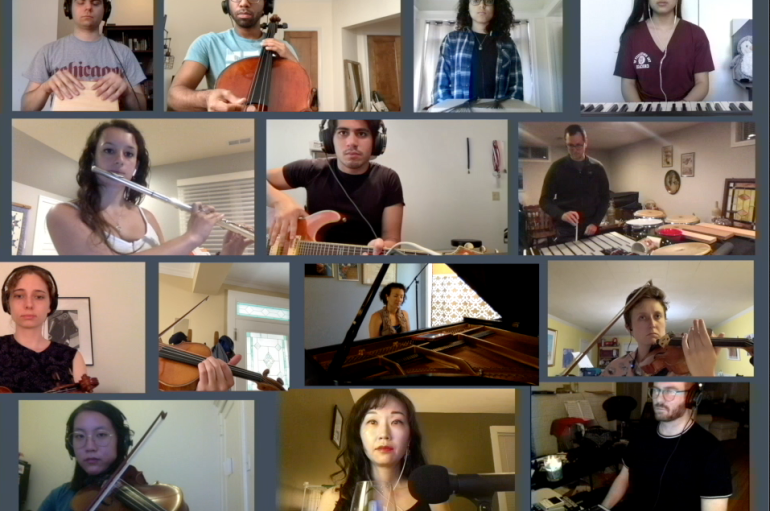
In the Spring Quarter of 2020, students from the Department of Music at the University of Chicago, including the Chamber Music Program and the Percussion Ensemble, set out to create a brand new piece of music for the unique moment (during the coronavirus pandemic).
The result is Andrew Stock's "from Gott! welch Dunkel hier."
From Andrew: "The piece is part of an ongoing collection of mixed- and open-format work. In several of the pieces from this set, an area of thematic focus for me is the prison (hence the abstracted use of Fidelio, probably the most famous ‘prison opera’). This one was written before the pandemic hit the U.S., but in preparing this performance I wanted to highlight the brutality of the present situation as well as that of the ordinary state of affairs.
"Clearly, isolation even in the most comfortable contexts (i.e. at home) is a struggle; in the carceral system it is inhumane; in a pandemic the crush of the system becomes more apparent as the crowded conditions of jails like Cook County needlessly expose inmates to infection and provide opportunities for community spread far beyond prison walls. In all my talks and notes about the piece I’m nodding to local and IL orgs working to decarcerate: Chicago Community Bond Fund, Coalition to End Money Bond, and others."
From Chamber Music Program Director Clare Longendyke: "The Chamber Music Program and Percussion Ensemble faculty and participants were devastated by the change to remote instruction and the ensuing cancellation of in-person chamber music making during the Spring Quarter. We were all craving a fulfilling means of collaboration, and this project fit the bill beautifully.
"We spent time over Zoom 'rehearsing' the soundworld that fit Andrew's piece, discussing the deeper meaning behind the work with the composer, and understanding Andrew's unique approach to notation. After choosing our sound objects (instruments, household items, and other sound-makers), we discussed balance, tone production, and ensemble, much like we would have had we been rehearsing a chamber music work by Beethoven, Brahms, or any other Classical- or Romantic-era composer.
"Online rehearsals were a time for the participants to familiarize themselves with the other sounds occurring simultaneously in the piece, since each part was recorded remotely without real-time collaboration, and put together digitally. Ultimately, we could not be entirely certain what the piece would sound like in its final presentation, but that element of indeterminacy would have been equally present in a live setting given the construction of the work. The resulting world premiere performance is absolutely in-line with what a live performance experience would feel, hear, and sound like from an audience's perspective.
"This collaboration between the Chamber Music and Percussion Ensemble Programs, Music Department students and faculty, and students from The College was a delightful way to combat the musical isolation necessitated by the pandemic. We are all grateful to have had the unique opportunity to premiere this University of Chicago-centric work of music!"
